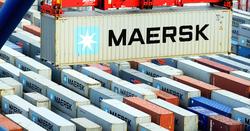Maersk revenues rise despite slow demand growth

Market stabilisation in the second half of the year helped Maersk remain in the black during 2018. But global trade pressures put a cloud over the year ahead.
Volume increase from Hamburg Süd acquisition boosts Maersk figures as rising rates are offset by increasing bunker costs
UNDERLYING profit at Maersk’s continuing operations slipped to $220m in 2018, down from $356m in 2017, as container market growth slowed to 3.7%, below the 4% forecast by the company at the beginning of last year.
“Supply growth remained high at the beginning of the year, reflecting the many new vessels entering the market as well as the low levels of idling and the scrapping of older vessels, which led to declining freight rates in the first two quarters of 2018,” Maersk said. “Market fundamentals stabilised in the second half of 2018, as effective supply growth tapered off and freight rates began to increase, and industry profits picked up in the third quarter from subdued levels in the first half of 2018. Profits were negatively impacted by the increase in bunker costs, and which were not fully compensated for by increase in freight rates.”
Maersk warned that the moderation in container demand growth in 2018 mirrored the slowdown in global macroeconomics and global export orders.
“The main risk to global container demand relates to a further cyclical slowing of the global economy,” Maersk said. “Emerging markets are particularly vulnerable to fluctuations in the US dollar and to economic developments in the US via their financial leverage. Moreover, a further escalation of the international trade tensions carries a significant risk to global trade.”
The world’s largest container line reported that revenues rose to $39bn for the year. Its ocean segment saw revenues rise 29% to $28.4bn on the back of increased volumes from its Hamburg Süd acquisition, and a 1.9% increase in average freight rates to $1,816 per feu. Without the Hamburg Süd contribution, revenues would have been up just 5.8% to $22.7bn.
"Although we had a challenging start to 2018, looking at our financial performance, we increased earnings despite significantly higher bunker fuel prices and lower than expected container volume growth in the second half of 2018," said chief executive Søren Skou. "However, profitability needs to improve."
Net profit including discontinued operations came in a $3.2bn, reversing a loss of $1.2bn in 2017. This was boosted by the closing of the Maersk Oil sale in 2018 and impairments applied to Maersk Drilling in 2017.
But Mr Skou said that the company had been able to reduce costs through its new structure.
“During 2017 and 2018, we realised more than $300m in savings by harvesting synergies across business segments mainly driven by closer collaboration between our Ocean segment and gateway terminals, further optimisation of our terminals and improved planning and utilisation of manufacturing capacity,” he said.
The acquisition of Hamburg Süd and consolidation of the two lines’ had delivered network and the operational synergies, he added.
“Aside from the benefits to the network, the acquisition has also enabled further utilisation of the terminals and benefits from joint procurement. Since the acquisition, we have realised $420m in synergies from Hamburg Süd and the expectation of synergies was therefore revised to a minimum of $500m by the end of 2019, from previously $350-400m.”
Separately, Maersk announced it had begun the demerger and separate listing process for Maersk Drilling, which it announced last August.
Shares in Maersk Drilling Holding and its subsidiaries, as well as certain other assets and liabilities will be contributed to a new company with the legal name The Drilling Company of 1972 and the shares will be admitted for trading and official listing on the Nasdaq Copenhagen exchange.
Maersk said it would seek shareholder approval for the demerger at its annual general meeting on April 2, with the publication of demerger documents due on March 4.
“Subject to such approval of the demerger, the shares in Maersk Drilling will be distributed to AP Moller-Maersk shareholders, who in addition to their shareholding in AP Moller-Maersk will become shareholders in Maersk Drilling,” Maersk said.